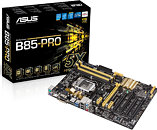Monday, July 15th 2013

ASUS Brings Haswell Processor Overclocking to H87 and B85 Motherboards
ASUS today announced that the latest UEFI BIOS for its motherboards based on Intel H87 and B85 chipsets unlocks previously inaccessible overclocking features for 4th generation Intel Core processors. Before this update, the overclocking features of new Haswell 'K Series' processors could be enjoyed only with motherboards based on the Intel Z87 chipset. Now, however, performance enthusiasts can exploit the power of Haswell K Series processors using ASUS 8 Series motherboards like the ASUS H87M-PRO and B85-PRO. The BIOS update is a free download for 10 ASUS motherboards - the H87-PRO, H87-PLUS, H87M-PRO, H87M-PLUS, H87M-E, H87I-PLUS, B85-PRO, B85-PLUS, B85M-E and B85M-G.
Once installed, the update enables frequency multiplier-based overclocking in one simple step for unlocked Intel K Series processors such as the Intel Core i7-4770K and Core i5 4670K. The BIOS also includes several features to make life simpler for PC users. A 'Last Modified' log makes it easy to determine when and how a particular setting was changed, and custom settings can be saved to a 'favorites' list for rapid switching to suit different applications.All-around protection for superior reliability
All ASUS motherboards based on Intel 8 Series chipsets feature high-endurance 5X Protection technology for the ultimate in reliability and durability. DIGI+ VRM voltage regulation ensures precise digital control over power delivery to the processor for reduced energy consumption and enhanced stability, while resettable fuses protect I/O ports and DIMM slots from short circuits and voltage spikes.
Electrostatic-discharge guards also protect sensitive components from electromagnetic interference and high-quality solid capacitors that are industry-rated for a lifespan for over 50 years of continuous use under typical operating conditions (at 65 degrees Centigrade) - over twice as long as traditional electrolytic capacitors.
The newly enabled overclocking features for Intel Haswell K Series processors and the superior reliability of 5X Protection technology reaffirm the ASUS commitment to giving customers the best in PC performance at a price they can afford.
UEFI BIOS updates for ASUS motherboards based on Intel H87 and B85 chipsets can be downloaded from:
Once installed, the update enables frequency multiplier-based overclocking in one simple step for unlocked Intel K Series processors such as the Intel Core i7-4770K and Core i5 4670K. The BIOS also includes several features to make life simpler for PC users. A 'Last Modified' log makes it easy to determine when and how a particular setting was changed, and custom settings can be saved to a 'favorites' list for rapid switching to suit different applications.All-around protection for superior reliability
All ASUS motherboards based on Intel 8 Series chipsets feature high-endurance 5X Protection technology for the ultimate in reliability and durability. DIGI+ VRM voltage regulation ensures precise digital control over power delivery to the processor for reduced energy consumption and enhanced stability, while resettable fuses protect I/O ports and DIMM slots from short circuits and voltage spikes.
Electrostatic-discharge guards also protect sensitive components from electromagnetic interference and high-quality solid capacitors that are industry-rated for a lifespan for over 50 years of continuous use under typical operating conditions (at 65 degrees Centigrade) - over twice as long as traditional electrolytic capacitors.
The newly enabled overclocking features for Intel Haswell K Series processors and the superior reliability of 5X Protection technology reaffirm the ASUS commitment to giving customers the best in PC performance at a price they can afford.
UEFI BIOS updates for ASUS motherboards based on Intel H87 and B85 chipsets can be downloaded from:




13 Comments on ASUS Brings Haswell Processor Overclocking to H87 and B85 Motherboards
Overclocking on Asus (and other brands') H87-based motherboards is definitely a great news for those who have already purchased one or are inclined/forced to settle for one. Whatever "extra" comes along is all good. But what about the rest of us who are still undecided? Will this BIOS update enable "complete" overclock-ability - like RAM as well? Or is it just gonna be the CPU? Is it gonna be as tweak-able as a Z87 model? Then where does it leave the Z87? What would be the point of getting a Z87-based board then? I'm not stating anything - just curious :)
Hmmm, true. The heatsinks aren't that encouraging either :(
:banghead:Not that I heard of. Might not even be CPU voltage that is shown, could be cache(likely).